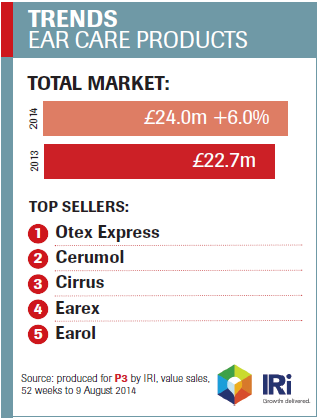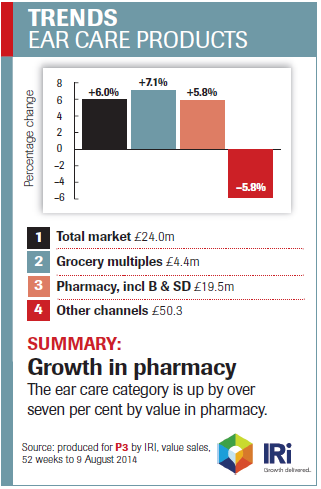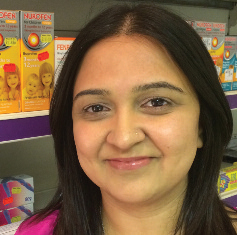Insight

You heard it here first
In Insight
Bookmark
Record learning outcomes
Boots UK says that ear health and hearing is a category with potential for future growth

Ear health is an area of consumer healthcare that many consumers are confused about. There are fewer major advertising campaigns than other categories to raise awareness of ear health issues. As a result, many consumers simply don’t know what to ask for when they, or their child, suffers with an ear problem.
In the past year, the total market for ear health has seen a increase of an impressive six per cent in value. Significantly, this includes an increase in pharmacy for the category of 5.8 per cent, which is running not too far behind a 7.1 per cent value rise in grocery (Source: IRI, value sales, 52 weeks to 9 August, 2014).
Being able to offer advice is one of the major advantages that community pharmacy teams will always have over supermarkets when it comes to ear health.
Many people who visit pharmacies with an ear condition have very little awareness of the different types of product available, so struggle to confidently choose something off the shelf. This puts pharmacy staff at a distinct advantage when a customer presents looking for something that will resolve their particular complaint, and gives an opportunity to offer advice and education.
Hearing checks
 People who think they may have a hearing problem are being advised to see a health professional as early as possible. Boots believes that this is a category with the potential for significant growth in pharmacy.
People who think they may have a hearing problem are being advised to see a health professional as early as possible. Boots believes that this is a category with the potential for significant growth in pharmacy.
According to Jonathan Gardner, managing director at Boots Hearingcare, people often attend hearing health checks because they feel their hearing has changed in some way and they want to find out more. ‘Sometimes a buildup of wax is to blame for that change in hearing; sometimes it is loss due to wear and tear of hair cells in the ear over time. Whatever the cause, people get the appropriate advice on what to do next; whether to consider a solution; visit their GP or, if no hearing loss is present, come back in two years for their next regular check,’ he says.
Boots ran its Great Big Hearing Check during September, a nationwide initiative to raise awareness of the importance of a regular hearing check, with free 15-minute slots available in stores. In particular, younger and older customers were targeted, with hearing loss commonly related to constant exposure to loud music, as well as being a problem of older age.
‘We see people of all ages come in for our free 15-minute check to find out how well they’re hearing. Listening to music (or any sound) over 89db for five hours or more a week can damage hearing permanently over time. With the volume on some MP3 players going up as high as 100db, it’s likely we’ll see more, younger, customers come to us with problems in the future.’
Community pharmacy has an important role to play in ear care, says Mr Gardner, saying that Boots Hearingcare is looking to work more with their healthcare teams to help them understand the signs of hearing loss, enabling them to provide the best advice.
In addition to the five new Hearingcare centres in Petersfield, Aberdeen, Hamilton, Bexleyheath and Chichester, there will be eight more opening in Boots Pharmacy stores by the end of 2014, with more planned for the future.
Category news
Ear health has been in the national news recently with discussion of a potential treatment for tinnitus. It was reported that a gel injected into the ear may slow damage to nerve cells in the ears that leads to some long-term cases of tinnitus. Early results had suggested that injecting the drug-containing gel into the ear could reduce the volume levels in tinnitus cases by up to half, in around 40 per cent of people with the condition.
According to a study of 10,000 people carried out in 2011, the most common ear complaints are popping and crackling (47 per cent), ringing (37 per cent), itchy ears (19 per cent), thumping and rushing sounds in the ears (18 per cent) and impaired balance (15 per cent).
 Dr Roger Henderson from ear care brand Cerumol comments, ‘Excessive wax can also be a common cause for mild tinnitus. The brain re-adjusts to compensate for the blockage, thereby causing the pulsating buzzes or ringing sensations that are heard when suffering from tinnitus. Ear drops are often a cheap solution and a safe treatment that can relieve discomfort caused by waxy build-ups.’
Dr Roger Henderson from ear care brand Cerumol comments, ‘Excessive wax can also be a common cause for mild tinnitus. The brain re-adjusts to compensate for the blockage, thereby causing the pulsating buzzes or ringing sensations that are heard when suffering from tinnitus. Ear drops are often a cheap solution and a safe treatment that can relieve discomfort caused by waxy build-ups.’
It’s not unusual for people to just use cotton buds or other mechanical means to clear wax. Unfortunately, they often find that this can compact the wax, making it more difficult to dislodge, and in some cases it may even damage to the ear. In research, Dendron, the makers of Otex Ear Drops, found some sufferers admit to using biros, paper clips and panel pins to try to remove ear wax.
Research has shown that first-time sufferers tend to contact their GP, sometimes with associated ear infections, but that on subsequent occasions sufferers will usually self-treat with OTC products. With the help of the ageing population, the market is expected to grow during the next few years, suggests the brand.
A troublesome build-up of ear wax does tend to be more common among older age groups. Up to two million people a year seek expert advice on treatment, and figures show that 67 per cent of sufferers are aged 45 or over, of whom half are aged 65 or over.
Over half (56 per cent) of Otex users are men, but most purchasers of the product are women. Sufferers tend to have recurring ear wax build-up, often more than once a year, with almost half of Otex users buying the product at least twice a year.
Customers who present in pharmacy with ear pain, itchiness and discharge in some cases may be suffering with otis externa or swimmer’s ear. EarCalm Spray can be recommended for this, and other superficial infections, and is available in a spray format to give better coverage of the affected area than drop-based products.
Sufferers admit to using biros, paper clips and panel pins to try to remove ear wax
For a different approach to wax build-up, a small study carried out by the RIZA Centre of Natural Medicine in Italy suggested that the use of Otosan Cones help clear excess wax. Seven subjects with excess ear wax but no plug formation were treated with the cones, and after one treatment, an examination showed a significant reduction of the wax in the ear canal and a reduction in symptoms previously complained about by patients.
For a different approach to wax build-up, a small study carried out by the RIZA Centre of Natural Medicine in Italy suggested that the use of Otosan Cones help clear excess wax. Seven subjects with excess ear wax but no plug formation were treated with the cones, and after one treatment, an examination showed a significant reduction of the wax in the ear canal and a reduction in symptoms previously complained about by patients.
Comment
 Bina Patel, Kalsons Chemists, Essex ‘The ear health category is an active one in my pharmacy and we have at least two people come in a day with an ear-related problem. It is usually ear wax and we have to advise the older generation in particular that syringing is not the best thing and that it is not recommended anymore because it is seen to cause more harm. We have to explain to them that using more oil and letting the ear wax dissolve naturally is the better option. People are often unaware that every time they shove something into their ear, it pushes the wax further back and clogs up the ear. There are a lot of children with ear problems at this time of year. Children with measles or mumps do tend to suffer from associated infections so we have to be alert as to what’s going on.’
Bina Patel, Kalsons Chemists, Essex ‘The ear health category is an active one in my pharmacy and we have at least two people come in a day with an ear-related problem. It is usually ear wax and we have to advise the older generation in particular that syringing is not the best thing and that it is not recommended anymore because it is seen to cause more harm. We have to explain to them that using more oil and letting the ear wax dissolve naturally is the better option. People are often unaware that every time they shove something into their ear, it pushes the wax further back and clogs up the ear. There are a lot of children with ear problems at this time of year. Children with measles or mumps do tend to suffer from associated infections so we have to be alert as to what’s going on.’
Â
 Pallavi Dawda, Masons Chemists, Coalville ‘In the past, ear health was a small category for us and we kept products behind the counter, but a recent move around has reinvigorated the category and increased sales. Traditional products for ear wax removal now sit alongside a broader range of specialised products and ear plugs. Most advice requests are for ear wax removal and what we offer depends on the history of the condition. We get a lot of questions about ear discomfort and we stock products that can provide relief for simple issues such as swimmer’s ear or external ear canal infections. Ear pain almost always results in a referral to the GP and the sale of a suitable analgesic, as the pain can be excruciating.’
Pallavi Dawda, Masons Chemists, Coalville ‘In the past, ear health was a small category for us and we kept products behind the counter, but a recent move around has reinvigorated the category and increased sales. Traditional products for ear wax removal now sit alongside a broader range of specialised products and ear plugs. Most advice requests are for ear wax removal and what we offer depends on the history of the condition. We get a lot of questions about ear discomfort and we stock products that can provide relief for simple issues such as swimmer’s ear or external ear canal infections. Ear pain almost always results in a referral to the GP and the sale of a suitable analgesic, as the pain can be excruciating.’
Â
 Alan Bradley, Cornwell’s Chemist, Newcastle-under-Lyme ‘Ear health isn’t a very broad category in pharmacy and anything pain-related or an ear infection needs to be referred. The category includes lots of ear wax products and we can treat a customer with an anti-inflammatory if they’ve got an earache. We tend to recommend Otex Ear Drops Dual Action for customers suffering from ear health problems, to help to remove wax and reduce the need for syringing. We also offer the popular sodium bicarbonate and olive oil products. It is difficult to improve sales in this category because a lot of the products are at a low price already and there’s only a small number of products that we can stock. Offering leaflets and information on the counter may help to inform customers about ear care.’
Alan Bradley, Cornwell’s Chemist, Newcastle-under-Lyme ‘Ear health isn’t a very broad category in pharmacy and anything pain-related or an ear infection needs to be referred. The category includes lots of ear wax products and we can treat a customer with an anti-inflammatory if they’ve got an earache. We tend to recommend Otex Ear Drops Dual Action for customers suffering from ear health problems, to help to remove wax and reduce the need for syringing. We also offer the popular sodium bicarbonate and olive oil products. It is difficult to improve sales in this category because a lot of the products are at a low price already and there’s only a small number of products that we can stock. Offering leaflets and information on the counter may help to inform customers about ear care.’
